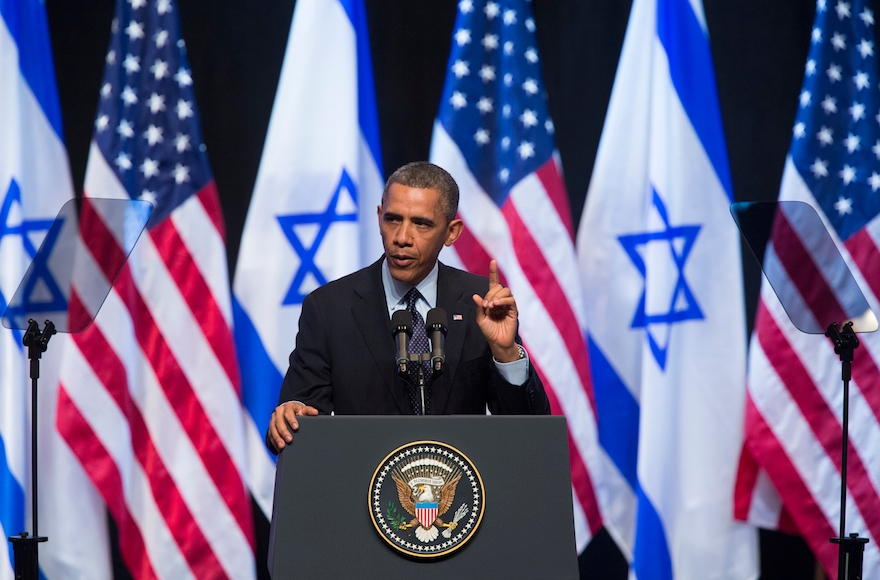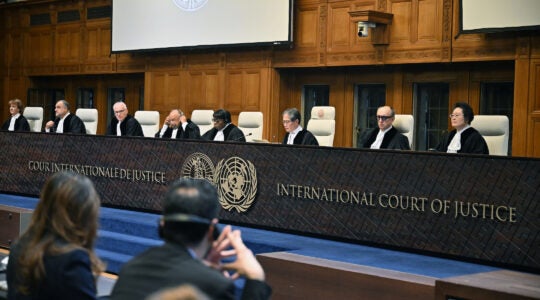(JTA) — During his campaign for president in 2008, I wrote a column suggesting that Barack Obama was struggling to connect with Jews because they weren’t sure that he supported Israel’s cause in his gut — that is, in his kishkes. I may have been the first to apply the term “Kishkes Factor” in relation to Obama’s politics and Israel.
Obama himself even heard a reference to the term, at least once. In an interview with the candidate that year, The Atlantic’s Jeffrey Goldberg asked Obama about “the kishke question, the gut question: the idea that if Jews know that you love them, then you can say whatever you want about Israel, but if we don’t know you … then everything is suspect.”
In some ways, I’ve come to regret the framing, which suggests that had Obama only worn his support for Israel on his sleeve, or taken a few more trips to the country, he would have won over the centrist and right-wing pro-Israel groups that dogged him for all eight years of his presidency.
In fact, the tension between Obama and Israeli Prime Minister Benjamin Netanyahu — and by extension, between the president and the pro-Israel mainstream — was a matter of policy, not emotion. Simply, Obama represented a way of being pro-Israel — call it liberal Zionism — that was no more popular among the pro-Israel mainstream than it was among the Israeli majority who backed Netanyahu and his right-wing government.
Liberal Zionism supports Israel as the homeland and nation-state of the Jewish people, but asserts it cannot live up to its founding principles — or its claims to be the Middle East’s only democracy — as long as it remains in control of the millions of non-citizen Palestinians living in the West Bank. Obama and his people were consistent on this point. Here he is in 2012 speaking at the AIPAC policy conference in Washington: “And I believe that peace with the Palestinians is consistent with Israel’s founding values — because of our shared belief in self-determination, and because Israel’s place as a Jewish and democratic state must be protected.”
And here is John Kerry, his secretary of state, speaking last month: “Today, there are a number – there are a similar number of Jews and Palestinians living between the Jordan River and the Mediterranean Sea. They have a choice. They can choose to live together in one state, or they can separate into two states. But here is a fundamental reality: If the choice is one state, Israel can either be Jewish or democratic – it cannot be both – and it won’t ever really be at peace.”
This conviction — that the only way to solve the Middle East conflict and preserve Israel’s democratic character was the separation of the two peoples — was behind Obama’s deep antagonism to the expansion of Jewish settlements. How could someone support a two-state solution, as Netanyahu said he did, while continuing to build on land that would be at the heart of any deal?
Coming from two such different places, Obama and Netanyahu were perhaps destined to never get along. Obama gambled — in his 2013 visit to Israel and in his appeals to American Jewish audiences — that he could bypass Netanyahu and convince the Israeli people and Jewish voters that the logic of the situation made his position unassailable. And Netanyahu pinned his hopes on the Republicans, sometimes openly colluding with GOP lawmakers and donors in casting traditions of bipartisanship aside. It’s a gamble, one can argue, that Netanyahu ultimately won, with an incoming administration and a Republican-led Congress that seem to be wholly aligned with Israel’s right.
The strained relationship between Obama and Netanyahu represents splits within the Jewish community itself, and between American Jews and Israelis. Poll after poll shows American Jews solidly behind a two-state solution and ambivalent, at best, about the expansion of settlements. Slight majorities of Israelis show at least an emotional preference for two states, but the majority feeling is that the idea is a pipe dream given the Palestinians’ recalcitrance, incitement and ineptitude. The result in Israel is a right-wing government adept at maintaining the status quo.
Most of the big American organizations are in the position of defending this status quo, accepting the judgment of Israeli voters and the government they elected. In the last eight years these organizations have committed themselves to combating what they say are the symptoms of the world’s refusal to accept Israel’s reality. This refusal takes the form of a one-sided Boycott, Divestment and Sanctions movement that in its moderate form puts the burden of peacemaking entirely on the Israelis and in its militant version rejects the very notion of a Jewish state.
Liberal Zionists, meanwhile, also reject BDS while arguing that Israel, as the undisputed military power in the conflict and the only adult in the room, could defuse the critics and write its own future if it made bold moves toward separation. They warn that young Jews are becoming more alienated toward Israel precisely because the values of occupation and settlement no longer reflected the millennials’ belief in tolerance, democracy and human rights.
Liberal Zionists have their champions at J Street, in Peter Beinart and George Soros, and in legacy organizations like Americans for Peace Now and Ameinu. But they don’t have an Israeli majority on their side, nor an Israel government, nor even a robust opposition in Israel to validate their views.
They did, however, have an American president, who could speak emotionally about the Israel they grew up on and still believe in while offering tough-love rhetoric imploring Israel to grab the opportunity for peace before it is too late.
By the end of Obama’s second term, it began to look like time was running out. Donald Trump and his party no longer talk about a two-state solution, and Trump nominated a U.S. ambassador to Israel, David Friedman, who fully supports the settlement enterprise and regards the pro-Israel left as “smug advocates of Israel’s destruction.” Although hardly representative of the average Jewish voter, Friedman — Orthodox, Republican, a firm believer in Greater Israel — nevertheless embodies a shift in power, and a coarsening of rhetoric, within American pro-Israel activism and Zionism itself.
It’s not clear what Obama could have done, from a liberal Zionist’s perspective, to buck these trends, not without a commitment from Israel, the Palestinians or their supporters to bring something new to the table. Obama could have wrapped himself in the Israeli flag and danced the hora on Independence Day — and in some ways, he did — and still would have found himself on the wrong side of the Zionist debate.
Perhaps sensing this, Obama offered a dubious parting gift to the liberal Zionists — and a bitter pill to the other side — in the form of a U.S. abstention on a largely one-sided U.N. Security Council condemnation of the settlements. Even a few of the major liberal Zionist groups here were ambivalent about the move — either because they have learned to distrust the United Nations or because they knew it would hand the Trump administration another cudgel with which to beat up on Democrats.
The right seized on the abstention as proof of what they had been saying all along: that Obama was antagonistic to Israel and perhaps even anti-Semitic. Even his middle name, Hussein, began to reappear in news releases denouncing the move.
More likely, however, the abstention was not the last-minute confession of an anti-Zionist but the frustrated parting gesture of a liberal Zionist scorned. You can fault Obama for a rosy, idealistic and ultimately naive view of an Israel that no longer exists, and of a vision of Israeli-Palestinian coexistence that might have been buried alongside Shimon Peres. But if the president was stuck in the days of Golda Meir and Yitzhak Rabin, of hardy kibbutzniks and selfless socialists, he’s not alone: A plurality, if not a majority, of American Jews probably share a vision for Israel’s future rooted in a fast-fading past.
William Safire once wrote that the greatest thrill a writer can experience is “to coin a word or phrase that fills a linguistic void and becomes part of the history of the era.” Kishkes, I am afraid, is not that word. Obama wasn’t too “cool” for pro-Israel tastes. He was merely the wrong kind of pro-Israel for the times.
JTA has documented Jewish history in real-time for over a century. Keep our journalism strong by joining us in supporting independent, award-winning reporting.






